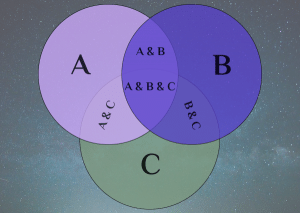In this post, I want to talk about conditional dependence and independence between events. This is an important concept in probability theory and a central concept for graphical models.
In my two-part post on Bayesian belief networks, I introduced an important type of graphical models. You can read Part 1 and Part 2 by following these links.
This is actually an informal continuation of the two Bayesian networks posts. Even though I initially wanted to include it at the end of Part 2, I decided it’s an important enough topic that deserves its own space.


 In my
In my  You can think of probabilities as
You can think of probabilities as 
 The concept of a sample space is fundamental to probability theory. It is the set of all possibilities (or possible outcomes) of some uncertain process.
The concept of a sample space is fundamental to probability theory. It is the set of all possibilities (or possible outcomes) of some uncertain process.